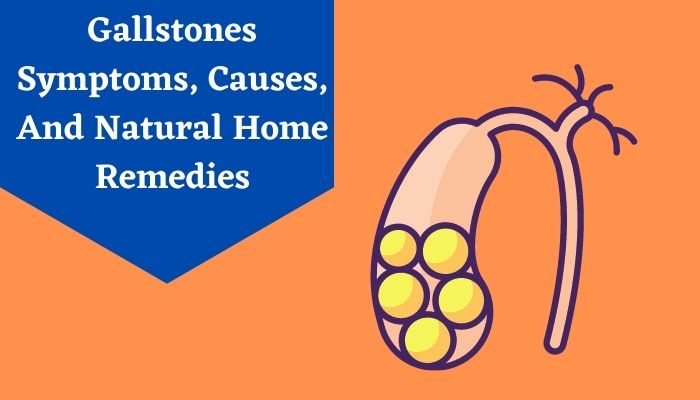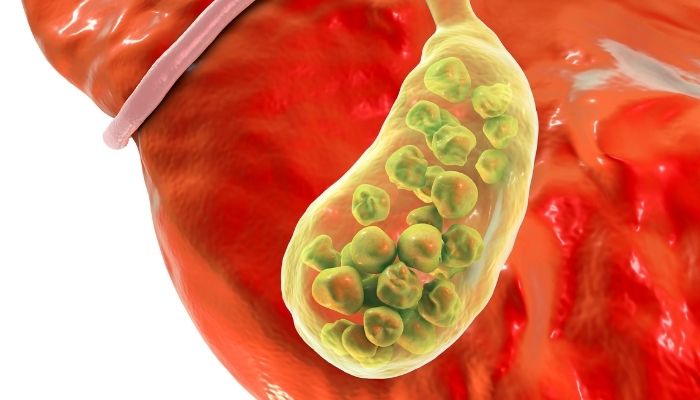Gallstones Symptoms, Causes, & Natural Home Remedies
Sneh Lata was a 55-year-old woman, who was constantly complaining of bad digestion, and stomach ache. Her son took her to a gastroenterologist, who doubted that these were gallstones symptoms. After an ultrasound, the doctor confirmed that Sneh Lata had gallstones in her gallbladder. He also revealed that gallstones symptoms in females are more common than in males. Gallstones are not rare but a common disorder that takes place due to the abnormal functioning of the bile duct in the gallbladder.
Let us read further to understand the different gallbladder attack symptoms and are there any home remedies to cure them?
What are Gallstones?
Gallstones are hard stone-like objects formed inside the gallbladder or in the bile ducts. These stones are made of either bilirubin or cholesterol that is formed in the gallbladder. A gallbladder is a small organ located just under the liver.Gallstones can range from 5 to 10mm in diameter and one can have hundreds of these stones in one’s gallbladder. Nearly 25% of the U.S. population is suffering from gallstones, this shows how common this health disorder is.
Types of Gallstones
There are mainly two types of gallstones:- Pigment Stones: These are dark-colored stones made of bilirubin.
- Cholesterol Stones: These are yellow-green stones made of hardened cholesterol and it is more common than pigment stones.
What Causes Gallstones?
Now, let’s understand what causes gallstones to form in your gallbladder? The reason is simple and that is when there is too much cholesterol or bilirubin in your bile and lack of bile salts, gallstones are formed. Moreover, experts believe that sometimes, when the gallbladder is not emptied, the remains turn into gallstones. Besides, some conditions make one more prone to suffer from gallstones such as:- Cirrhosis
- Metabolic Syndrome
- Low HDL Cholesterol
- Bile Ducts Infections
- Hemolytic Anemia
- High Triglyceride Levels
- Diabetes
- Obesity
- Rapid Weight Loss
Women at More Risk of Gallstones
One shocking fact about gallstones is that it is believed that women are at more risk of developing gallstones. This happens due to the following reasons:- Hormonal Changes
- Multiple Pregnancies
- Obesity
- Rapid Weight Loss
- Family History
Symptoms of Gallstones
Out of 10 people suffering from gallstones, nearly 5 never realize the gallbladder attack symptoms. Let us understand the common gallbladder symptoms to detect:- Loss of Appetite
- Rapid Heartbeat
- High Temperature
- Diarrhea
- Itchy Skin
- Yellowing of the White Area of the Eyes or Jaundice
- Chills
- Pain in the Upper Right Abdomen or Center of the Stomach
Unusual Gallbladder Symptoms
In the case of asymptomatic gallstones, one may not be able to even detect any symptoms, as there is no pain or discomfort. Pain in such cases occurs when the gallstones start blocking the bile movement in the gallbladder. Some of the unusual gallbladder symptoms include:- Chest Pain
- Bloating
- Indigestion
- Nausea
- Diarrhea
Treatment for Gallbladder Stones
Gallstones can be treated either in surgical or non-surgical ways.- Surgical Treatment: Cholecystectomy is the name of the surgery usually done to remove the complete gallbladder to remove gallstones. This surgery is conducted in two forms:
- Open Cholecystectomy: In this surgery, the gallbladder is inflamed and scarred, and infected. The doctor may combine this surgery with laparoscopic cholecystectomy.
- Laparoscopic Cholecystectomy: This is a more common surgery for gallstones, where the gallbladder is removed by inserting a small lighted device and the patient can go back home on the same day.
- Non-Surgical Treatment: In case, the doctor feels you don’t fit into an eligible patient for a gallbladder surgery due to old age, he/she may prescribe the following non-surgical treatments:
- Oral Dissolution Therapy: In this, the patient is given oral medications like Chenix and Actigall to break down the gallstones. It is perfect for those suffering from cholesterol gallstones.
- Percutaneous Drainage: In this treatment, a needle is placed into the gallbladder to withdraw the bile out and offer some relief from gallstones.
- Shock Wave Lithotripsy: Here a machine called a lithotripter is used to pass shock waves to break the gallstones into smaller pieces.
Natural Home Remedies for Gallbladder Stones
- Apple Cider Vinegar: Apple cider vinegar mixed into apple juice acts as a perfect gallbladder cleanser for those suffering from gallstones. Apple cider in itself yields plenty of health benefits and is considered to be a natural remedy against gallstones.
- Psyllium Husk: Similarly, if you wish to keep gallbladder attack symptoms at bay, try using a psyllium husk that prevents the formation of gallstones. Some studies have revealed that psyllium is beneficial for the pancreas, heart, and some other parts of the body as well.
- Artichoke: Third efficient natural remedy to cure gallbladder stones is by consuming globe artichokes. Even consuming an extract of artichoke will be beneficial to promote the production of bile to aid in the liver as well as gallbladder function.
- Castor Oil Pack: Do try a castor oil pack to get some relief from gallbladder symptoms. For this, you need to apply a towel or cloth soaked in warm castor oil onto your abdomen and leave it for an hour covered beneath a hot water bottle or heating pad.
- Acupuncture: The Chinese alternative therapy such as acupuncture can also offer some relief from inflammation caused due to gallstones. Acupuncture has proven results in relieving people of several health disorders like nausea, stomachache, backache, and even gallbladder stones.
- Yoga: If suffering from gallbladder stones, and don’t want to get operated on for it, then you must consider trying yoga poses meant especially for gallstones. Such as Bhujangasana, Shalabhasana, Dhanurasana, and Pachimottasana.



